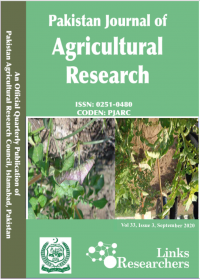Exogenous Supply of Boron at Various Growth Stages Improved Wheat Yield
Exogenous Supply of Boron at Various Growth Stages Improved Wheat Yield
Shakeel Ahmad Anjum1, Sami Ullah1*, Muhammad Mohsin Raza2, Mohsin Raza1, Muhammad Abbas3, Ijaz Ahmad4, Malik Muhammad Yousaf2, Muhammad Zeshan5, Adeel Abbas1, Mehmood Ali Noor1 and Mohsin Nawaz1
ABSTRACT
Boron (B) affects plant growth and development by influencing vital processes like cell division, cell wall formation, water relations, meristematic tissue growth, carbohydrate metabolism, and pollen tube growth which suggests plausible effects on all these activities due to its deficiency. Therefore, a field trial was set up to assess the efficacy of different levels (control, 0.01 M and 0.05 M) of foliar applied B at booting, anthesis, and grain filling growth stages of wheat crop respectively. Results revealed that B application at the rate of 0.05 M solution substantially increased plant height, productive tillers, 1000 grain-weight and final grain yield. It was observed that 0.05 M B applications at delayed growth stages after booting is less effective in improvement of yield attributes of wheat crop as compared to booting stage. Economic analysis revealed that 0.05 M B application gave highest net income and benefit-cost ratio. Thus foliar application of 0.05 M B application (foliar) at booting stage can improve wheat productivity possibly by optimizing post-vegetative plant metabolic activities during grain filling, in contrast to late application rate.
To share on other social networks, click on any share button. What are these?






